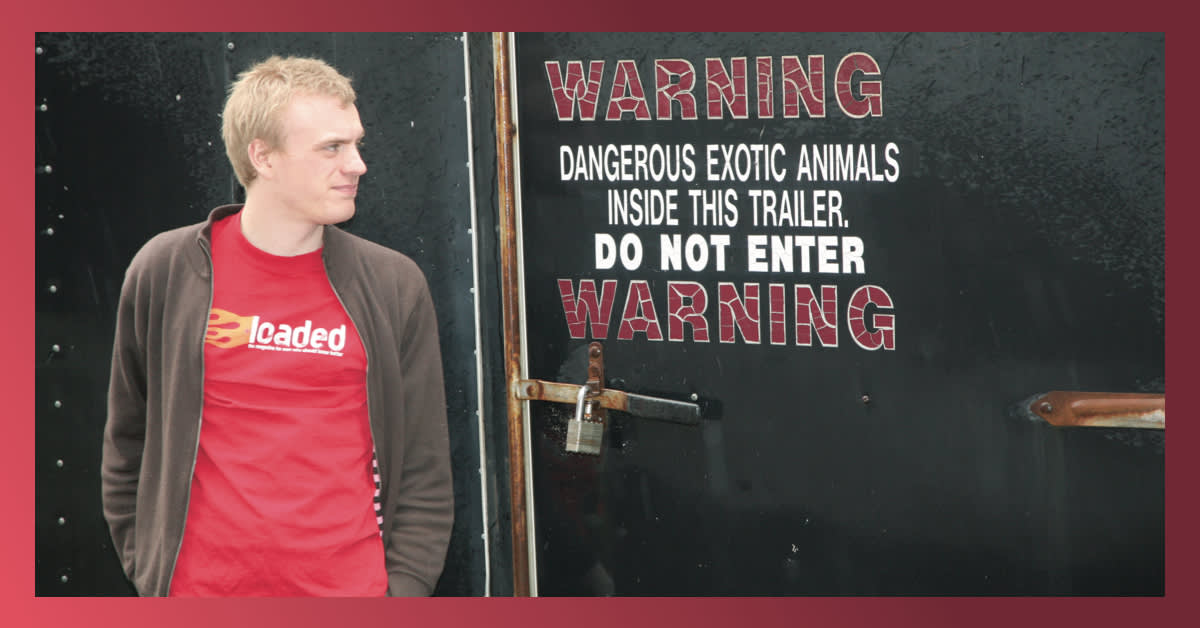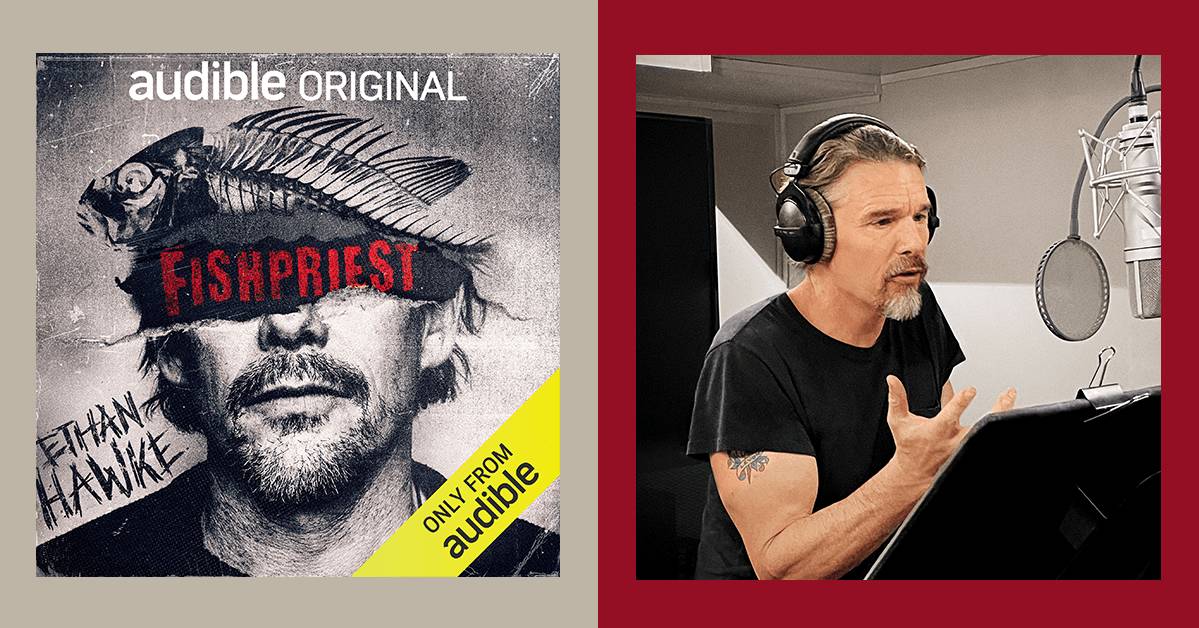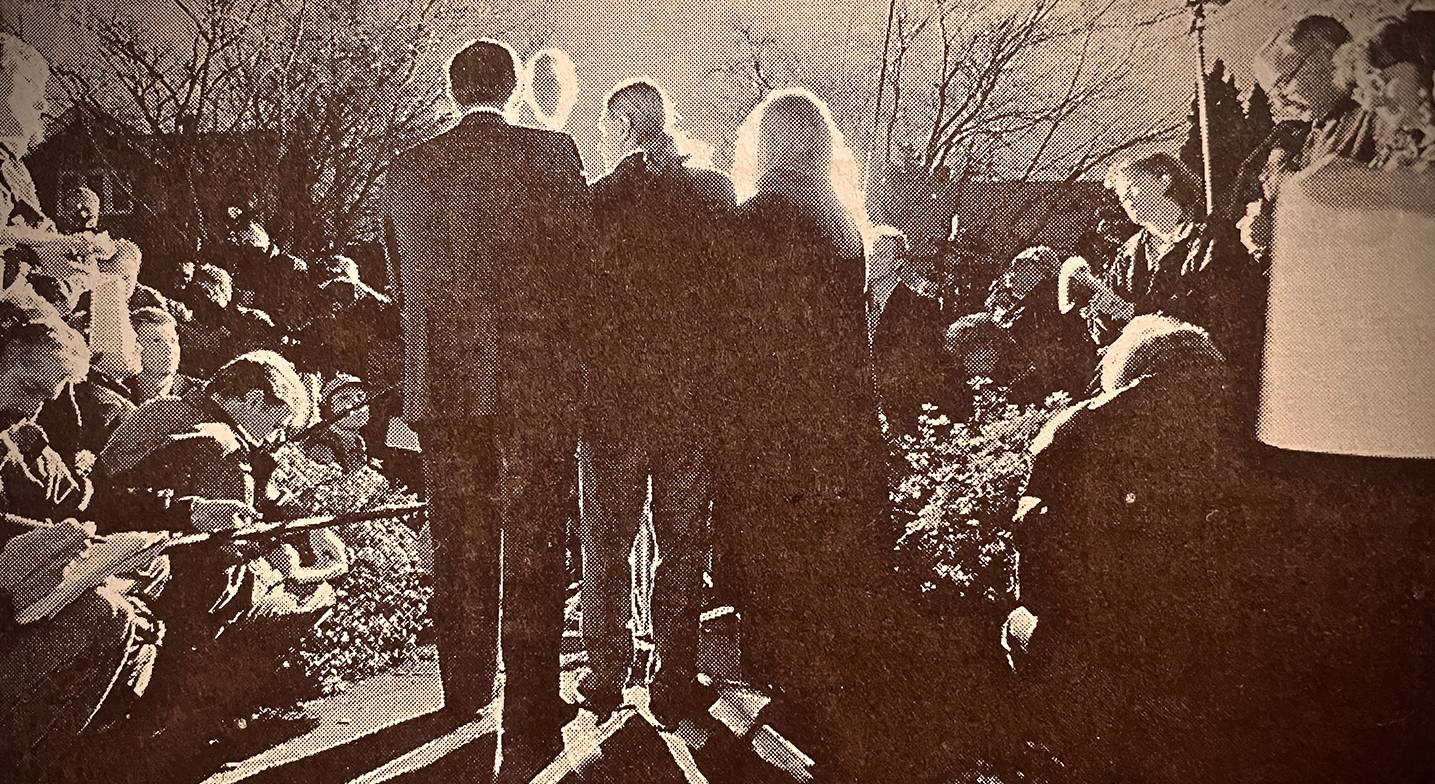Photo: Ian Dewsbury.
The scar drawing a pale line across my right thigh is hard to see, but you can just make it out. It was once accompanied by three adjacent parallel scar lines, but those have completely faded in the 16 years since they were inflicted by the claw of a seven-foot-tall black bear named Caesar.
In April 2006, in a nightclub closed to the public in Akron, Ohio, I was grappling Caesar while wearing an almost pornographically tight wrestling leotard. I was a writer for the UK men’s magazine Loaded, whose name was emblazoned across my chest as I tussled with the animal.
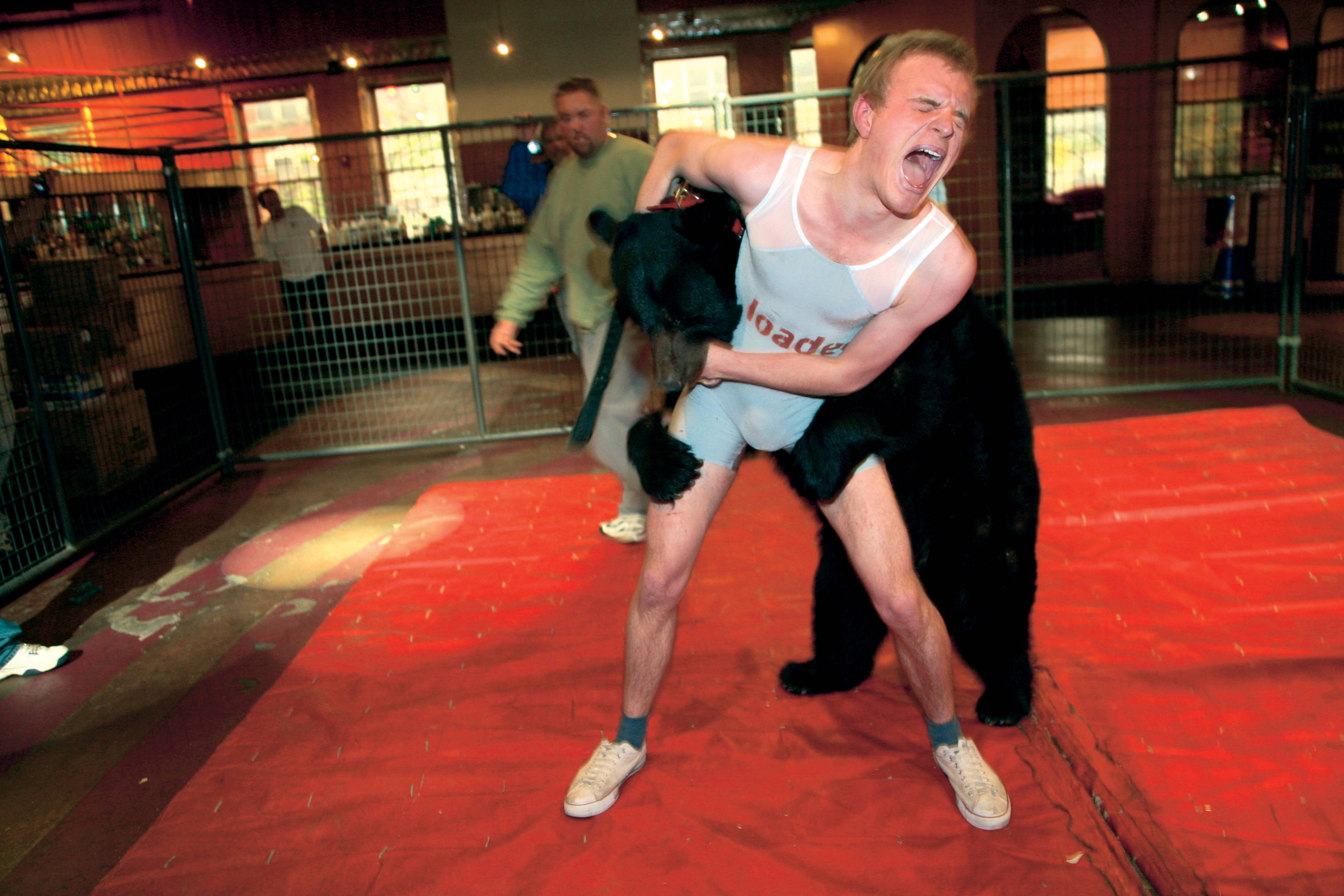
Jamie and Caesar in 2006. Photo: Ian Dewsbury.
In the ’90s, Loaded had huge cultural clout, both chronicling and defining the ascendance of the UK’s “lad culture,” a hedonistic celebration of booze, drugs, sex, raving, and rock ’n’ roll. The magazine contained as many pieces of great writing as it did photos of naked women, and it was a publishing phenomenon.
By the time I worked there, in the mid-2000s, Loaded’s heydays were gone, and the magazine mixed morally reprehensible stunt features with tackier near-nude photoshoots. Unsurprisingly, that editorial policy saw the brand disintegrate into cultural irrelevance shortly afterwards.
But back then, at age 21 and under pressure to deliver more controversial, high-octane features, I thought I’d struck furry gold when I read reports from Ohio about a man named Sam Mazzola and his sidekick, Caesar the Wrestling Bear. Sam organized bear wrestling shows in the Akron nightclub, letting drunk clubbers grapple the creature while animal rights protesters waved placards outside. I phoned Sam, and a few days later I was in Akron, screeching while Caesar bit the top of my head.
That was when my obsession with Sam’s world began, fueled by the ballistic bear-wrestling empire he’d created as well as some disturbing and confusing behavior I noticed from him. I go into more detail about my wrestle with Caesar, and why I returned to tell his fuller story, in the first episode of Beast Master, the podcast inspired by—but which ultimately became so much bigger than—that afternoon in the bar. Working on the series helped me understand the magnetic, blinding pull of exotic animals, an allure that Sam had built his career on and used for darker purposes.
In 2006, public awareness of animal welfare issues was pretty well established in both the US and UK. There really weren’t any excuses for archaic events like bear wrestling anymore, and there weren’t many US states in which it was legal. But as anyone who’s taken a photo with a tiger or ridden an elephant on holiday knows, the draw of exotic animals can be powerful, often obscuring morals. This power bulldozed any animal cruelty concerns I should have had when I decided to wrestle Caesar and preserve it in print.
Today, I have no doubt that the event I participated in was cruel, despite Sam’s claim that wrestling was “natural” for bears. Natural in wild rural Alaska, perhaps, but not at 1am in a nightclub, surrounded by hundreds of boozed-up tough guys queuing to try and smack a bear to the ground.
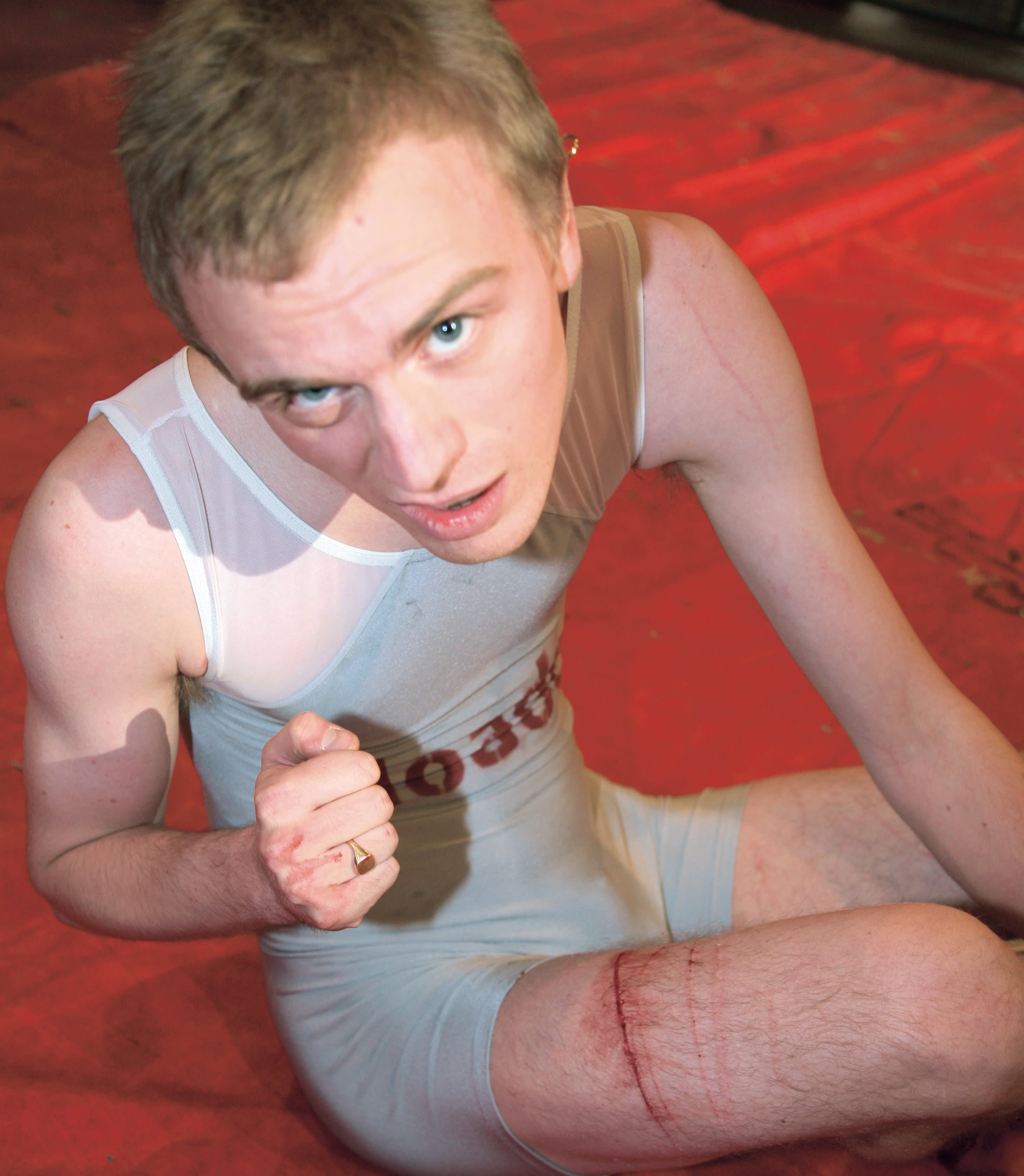
Photo: Ian Dewsbury.
By the time I met Sam, who had been organizing such events since the ’80s, he was facing a lot of pressure from animal rights activists and the media. But there were also still many who approached his enterprise like I did. Some local reporters continued to wrestle Caesar for quirky features, helping to legitimize Sam’s position.
These days that’d be unlikely to happen—can you imagine the social media execution? But even now, decades on, many people argue that shows like Tiger King glorify cruel exotic animal industries in the US. According to the World Wildlife Fund, there are 5,000 captive tigers in the country, more than the 3,900 believed to exist in the wild globally. Most tigers in the US are privately owned, rather than in public zoos. The view that interactive exotic animal events are usually intrinsically cruel is not yet fully dominant.
My subsequent reporting on other animal cruelty issues may have scrubbed my soul a little, but I don’t exactly regret wrestling Caesar. By promoting bear wrestling, I was guilty of perpetuating its cruelty, but I just don’t generally see the point of having regrets—you need to live with your decisions and actions. Like so many other young people, I was intoxicated by the wild, morally corrupt world Sam had built with his animals and wanted the thrill of getting close to it.
When I notice my thigh scar, however, I do at least cringe at the memory—as I do when recalling much of my brief time at Loaded, before my job there was made redundant and I moved on to a less controversial career with an indie rock magazine.
I wouldn’t wrestle a bear, ride an elephant, or take a selfie with a drug-addled tiger now, but the pull of exotic animals is still strong for me. It’s a large reason why I’ve stuck to the Sam Mazzola story so closely since I met him. Spending years creating Beast Master was another way of feeling the majestic power of tigers, lions, and bears, without having to lock limbs with one in a wrestling ring.
Editor's note: Beast Master is an investigative podcast exploring the life and death of exotic animal handler Sam Mazzola. Although the incident related here was the initial catalyst for the investigation, Beast Master delves much deeper into the animal welfare and ethical issues at play, with guidance from animal welfare experts. This content is for mature audiences only. Discretion is advised.
